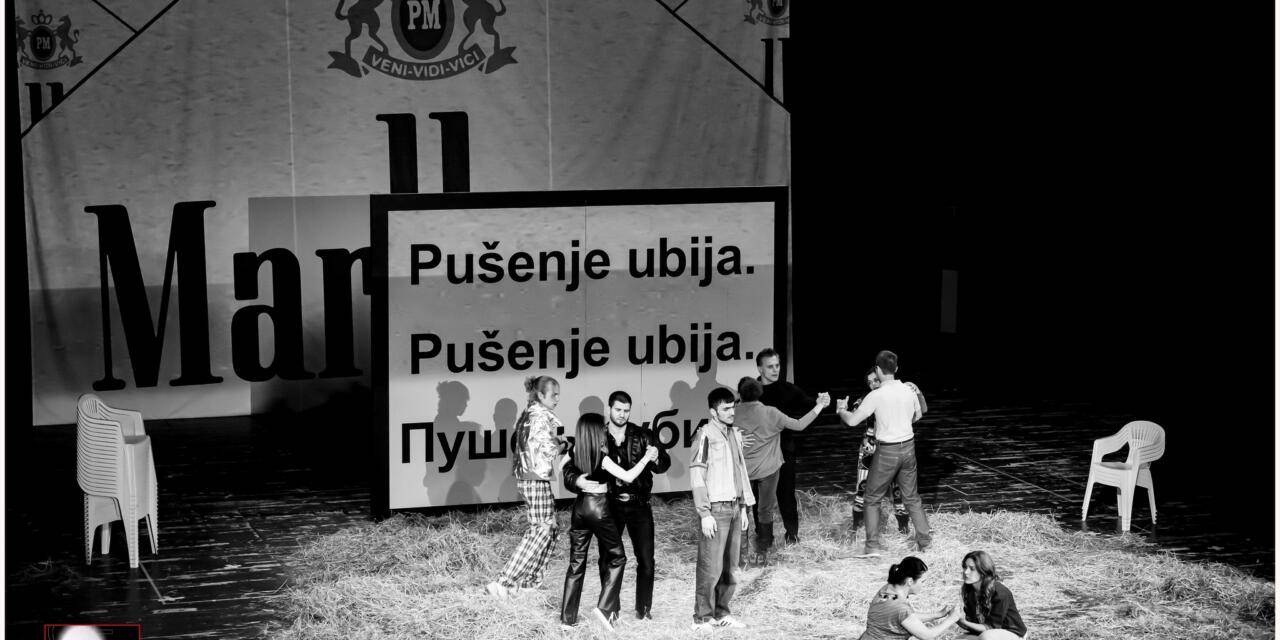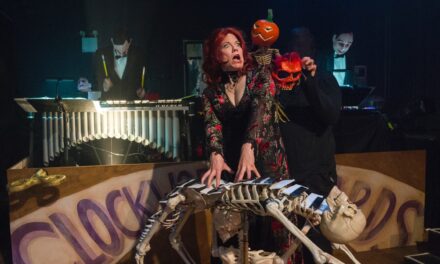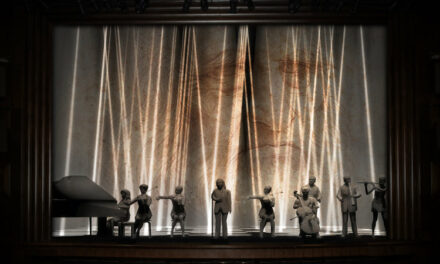The (Post)apocalyptic Light of the Stage – is the slogan of the 69th Sterijno pozorje, a festival held in Novi Sad (Serbia). This year, the audience had the opportunity to watch inspiring theatre plays mostly based on contemporary domestic dramatic texts. The stage was conquered by symbolic scenographies, camera environments, “twin peaks” atmospheres and various directions that briskly made their way through dramatic texts under theatrical and scenographic commercial advertisements, video projectors and smoke from machines.
At the festival, there were seven performances as part of the competitive selection and three performances as part of the International Selection Circles. One play, directed by Zlatko Paković, entitled After a Nervous Breakdown, Katalin Ladik Quits Her Job as a Bank Clerk And Becomes A Conceptual Artist was performed out of competition. It is a pseudo-documentary performance that breaks down the actor’s existence and reveals the cult of artistic personality Katalin Ladik, poet, actress and conceptual artist to new generations through performance, poetry, theatrical madness and historical, artistic and political symbols. The theatre audience was enthusiastically swallowed by the black hole of absurdity from the Slovenian play A Rainy Day in Gurlitsch directed by Sebastijan Horvat, based on the text of Milan Ramšak Marković, while the spiritual striptease of the play Once Upon a Time in Novi Sad by the inimitable director Andraš Urban and the ingenious ensemble of the Novi Sad’s Theater/Újvidéki Színház created a timeless, sizzling musical-stage spectacle. The dramatic text of Mate Matišić, My Sad Monsters in the play of the Gavella Drama Theatre, directed by Vito Taufer, revealed the tragicomic story of the case of a playwright who is reborn in his works because when he dies there is no burial place for him in his native region. Director Selma Spahić and Chamber Theater 55 from Sarajevo in the prelude Violet gradually unfold in front of the audience the worlds of inner and outer, family and love, egocentric and fluorescent, in an intimate setting. The main Sterija award went to the play Fathers and Forefathers of the National Theater in Belgrade, directed by Veljko Mićunović, based on the novel by Slobodan Selenić, dramatized by Kata Đarmati.
Theatre director Ivica Buljan, known for his specific aesthetic combinations and great talent for reading the text accurately, capturing the textual core, directs the essence thoughtfully and authentically. This year he was a guest at the Sterijno pozorje with two of his directions. The first is a co-production of the National Theater of the Republika Srpska (Banja Luka) and the Sterijno pozorje (Novi Sad), Little Wars and the Cabins in Zara, based on the text of a young writer, Vida Davidović, which was included in the competition selection. The piece depicts the combination of two equally tragic times and the change of unfortunate generations under the local wars of the Balkans in the nineties of the last century and amidst the department stores of the commercial worlds of today. Buljan’s second direction, as part of the International selection Circles, is the play Red Water (HNK Split), which creates a complex criminal plot and rustic elements of the environment of the wild homeland of the Dalmatian areas. The scenography for both plays is signed by the genius Aleksandar Denić.

Little Wars and the Cabins in Zara directed by Ivica Buljan. Foto: National Theater of the Republika Srpska
Little Wars and the Cabins in Zara
Vida Davidović’s text observes two generations. The first one survived the war with the rock band Bjelo Dugme, and the second one found its atomic shelters in the cabins of Zara. The piece is about two heroines, two faces, past and present, under the name of Mala, and represents the image of a mother and daughter marked, branded by the apocalyptic war of the nineties, whose scars and birthmarks they both carry, because they cannot get out of their own skin.
Aleksandar Denić’s stage space is ruled by a balkanized western. A large picture in the background shows a pack of cigarettes, a red Marlboro and a three-dimensional cutout of the “slogan” – “Smoking kills” – in Cyrillic and Latin script. This label, through letters, characterizes three languages and three countries that were parts of the former Yugoslavia. There is also a direct allusion to the Yugoslav band Zabranjeno pušenje (transl. No smoking) whose members were from all those entities and which disbanded at the same time as the former state. Garage rock, new primitivism, garden chairs and hay scattered on the stage represent the symbols of the past, the former country in Denić’s scenographic worlds, while the studio lights show the future of the new generation, the city of dawning and glare, the French metropolis of fashion. Leather jackets and fur coats, guns and guitars of the nineties of the last century replace the elegant ballet poses, glittery blouses and neons of the techno club. However, the white nightgowns and wedding gowns, ballet shoes become stained with the blood of the Balkan wars, where red-haired “girls who have fragrant skin” live. Ana Savić Gecan’s costumes design the characters of both eras, protagonists and antagonists of their concrete existence.

Little Wars and the Cabins in Zara directed by Ivica Buljan. Foto: National Theater of the Republika Srpska
Direction by Ivica Buljan, who is always capable of creating an innovative adaptation from a literary template and making sense of an experimental one, shapes this very interesting dramatic text in a special way. An anti-fairytale, an anti-war setting, a story about a stormy age and its remnants and consequences that pervade through tragic destinies and destructive motives (such as insincere – versus forbidden, but in both cases distorted love, disorders in the form of imaginary friends, the breath and smell of death that follows every…), the director skilfully and boldly assembles. The images of the dramatic text pass into each other, at the end of each sequence they strike a new blow. Buljan draws out the very core of the two main characters, Mala (Anđela Tasić) who is “beautiful like she is from a fairytale” and her daughter – another Mala (Anđela Rakočević) who “dances like she is in a fairytale.” So, the beauty of a woman and the beauty of a dance. In a harsh world, in an ungrateful and duplicitous time, in a desecrated and ruined space, the director creates visual beauty in which each scene is a story in itself, full of emotion and elegance. The scene of the endless dance – the choreographic collision of all the characters of the drama in the performance – is particularly noteworthy. The war of the nineties started at the same time as the ballet class. The actors on the stage dance faster and faster in pairs, changing partners with each step, and lose themselves like crazy in the terrible rhythm of war shootings. And in the Balkans, They Shoot Horses, Don’t They? While the war is going on – they dance, when the war is over – she continues to dance. The play’s epilogue is striking proof of this: the other Mala runs away from the past to Paris, to the ballet school, to her “Zara cabin,” the light goes out, she dances, the song Dernière Danse by the French singer Indila is heard in the background, which is distorted into a modern techno remix. The lyrics of the song are as follows:
“I am dancing with the wind, the rain
A bit of love, a bit of honey
And I’m dancing, dancing, dancing, dancing, dancing, dancing, dancing
And in this noise, I’m running and I’m afraid
Is this my turn? Here comes the pain
In all of Paris, I let myself go.”
This performance at pozorje caused divided opinions. The poeticization of the painful past of the families from this area and the determination of the young writer, as well as the director, to show the sad picture of war and its painful traces in a visually playful and optimistic way, playing at the end with a smile on the face, hoping for a better future, is not something the audience is used to. Young people give their voice to this production. Little Wars and the Cabins of Zara, as a combination of a youthful text and an experienced director, represents the history of the past and the theatre of new generations who sense and feel – have the alertness for what they have not experienced. New generations are surrounded by traumatic representations and stories about a war that is not theirs, that they do not understand, but still haunts them and is an imaginary part of their collective youthful consciousness. Theatrical presentation of what was in close connection with what is now, the penetrating voice of today is proof of the great need for dramatic texts that will deal with modernity, and the questions of the twenty-first century. Director Ivica Buljan does just that. Successfully.
Red Water
The rotating stage, the work of scenographer Aleksandar Denić, orbits around its axis in front of powerless people in the play Red Water. The performance begins with a song, the opening credits of the Yugoslav drama series Bolji život (transl. A Better Life), which is heard from an old switched-on television stuck in a wooden set of “Šipad” furniture for the living room (a symbol of the middle class in the country at the time). “I want life, a better life, to grab it like a tiger. Life is not a child’s play.” The text and the depressing melody of the TV soap opera are suddenly replaced by real life in 1989 – the disappearance of the daughter of a family of four, who will be searched for many years, in this crime theatre piece, along the Dalmatian coast. A dramatic plot that covers a time span of almost thirty years, a hopeless search, a collective alibi and a collapsing system, is a reflection of the overall picture of the bloody ruins of the former communist state. The director and scenographer skilfully play with this ideological collapse by placing red symbols on the stage, such as a billboard with a trade-marketing action for tomatoes in the spirit of that time, rows of stacked Coca-Cola crates and a red advertisement for a once-popular brand of cigarettes on top of a prefabricated bus stop – as symbols of consumer society and as representatives of consumerism in their gardens. The title of the novel by Jurica Pavičić, as well as the dramatization by Ivor Martinić, and the play by Ivica Buljan itself refer to the tragic course and outcome of the plot, but it also refers to a system that has set its roots deep, has crept into both the land and the water – and now, when failed – only unsolved cases remain. Director Buljan opens the story gradually, letting dramatic tension and uncertainty develop constructively. Through Ivor Martinić’s dramatization, the characters are assembled and spilt, disassembled in the face of unfortunate circumstances, and from a naive youthful love story, a difficult criminal drama and investigation emerge, which the director filigrees, giving each segment a special tonality.

Red Water directed by Ivica Buljan. Foto: Srđan Doroski
Ultimately, the country, people, family, individuals, place, house – everything disappears, everything completely collapses as if it never existed, all those lives were drowned by the red water. A general deluge. Survivors, only a small part of humanity and a tiny bit of the world surfaced. Different, completely new. Is that the (post)apocalypse?!
This post was written by the author in their personal capacity.The opinions expressed in this article are the author’s own and do not reflect the view of The Theatre Times, their staff or collaborators.
This post was written by Emilija Kvočka.
The views expressed here belong to the author and do not necessarily reflect our views and opinions.


















